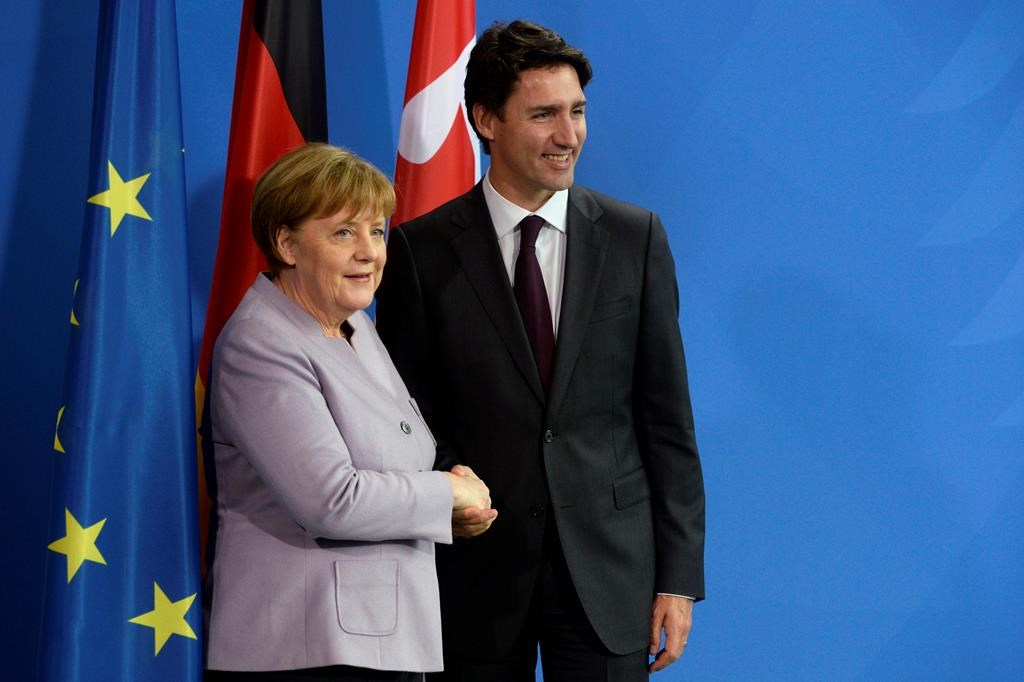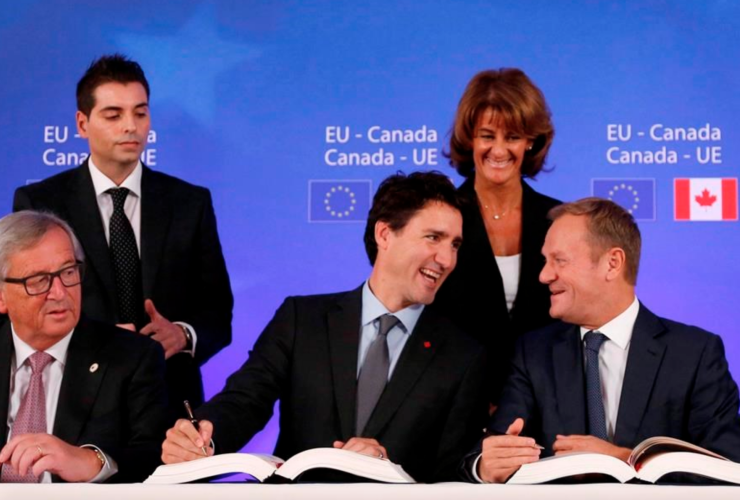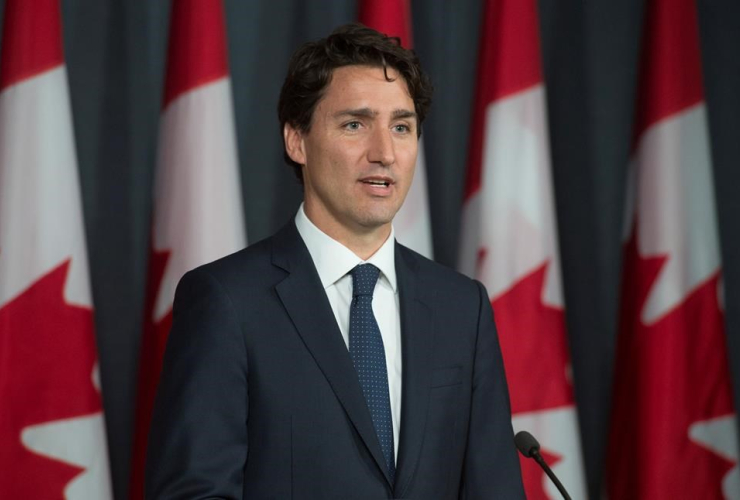Canada is demonstrating its commitment to NATO in ways that go beyond simple military spending, Prime Minister Justin Trudeau says.
During a news conference Friday in Berlin, Trudeau acknowledged the spending target agreed to in 2014 by the members of the global military alliance — two per cent of GDP annually — but described Canada and Germany as principal NATO actors who do much of the "heavy lifting."
"There are many ways of evaluating one's contribution to NATO," Trudeau said, flanked by German Chancellor Angela Merkel, who has already made it clear that Germany plans to boost its share of the financial burden.
"When you look at the countries that regularly step up — delivering troops, participating in missions, being there to do the heavy lifting in the alliance — Germany and Canada have always been amongst the strongest actors in NATO."
He said Canada is in the midst of "significant procurement projects" — fighter jets and shipbuilding, specifically — and working with NATO to ensure the alliance is being as effective as possible.
"It is a source of strength and pride for Canada that we will be taking on a framework mission in Latvia, leading the battle group there as an important part of strengthening NATO's eastern flank," he added.
"That is something we will always continue to stand for."
Canada's position stands in somewhat stark relief against the German message, although Merkel did make a broader point about the importance of NATO's role in the world, regardless of who might be picking up the cheque.
"This commitment (to the 2014 target) hasn't changed to this day, so we intend to pursue this political course; the defence budget this year compared to last year was increased by eight per cent, so that's an important step forward," Merkel said through a translator.
"Germany shows that it is ready and willing to acknowledge its responsibility in this respect."
Trudeau and Merkel also sang the praises of Canada's free trade deal with the European Union, just one way in which the two leaders are hoping to promote a progressive, pro-trade philosophy in the face of protectionist headwinds emanating from the United States.
Asked about his meeting with President Donald Trump, Trudeau said his approach remains to seek out common ground — and in the case of Canada, Germany and the U.S., that means helping grow the middle class.
"My approach is always to look for things that we have in common and to focus very much on the things that are of importance to the Canadians that I was elected to serve," he said.
"There will always be differences of opinion ... (but) we can focus very clearly on the things we have in common: a desire to help our middle classes."
With the thrill-a-minute U.S. presidency very much top of mind in Europe and elsewhere around the world, Trudeau's political-celebrity status was on full display Friday on the front of at least two German language newspapers: "the anti-Trump is here" and "Sexiest politician alive," read the headlines.
Trump has called the 28-country NATO alliance obsolete, while U.S. Defence Secretary James Mattis delivered an ultimatum of sorts this week, saying the U.S. expects its allies to start spending more on defence or else it will "moderate its commitment."
A Canadian government official who briefed journalists on the condition of anonymity prior to Trudeau's departure for Europe this week said Canada is "quite comfortable" with its current contribution to NATO.
Canada currently spends 0.99 per cent of gross domestic product on defence. That's well below two per cent, a threshold only a handful of alliance countries have met.
And Trump is far from the first U.S. president to lean on its NATO allies, German ambassador Werner Wnendt noted.
"We have heard this from previous presidents of the United States ... that they said there must be a fair burden sharing," said Wnendt. "That's well accepted in the alliance, so we will deliver."
During a June 2016 speech to Parliament in Ottawa, U.S. President Barack Obama softened his request of Canada by saying he wanted to see more Canada in NATO.
Prior to that, the Canadian ambassadors for former president George W. Bush were far more blunt in calling on Canada to pull its weight on defence.
On Tuesday in Brussels, Mattis made some specific demands. He called on NATO put a plan in place this year that lays out a timetable for governments to reach the two-per-cent target.
There's also some daylight between Trudeau and Merkel on the best way to stimulate economic growth, which was also a key topic of their meeting. The two first met in November 2015 at the G20 summit in Turkey, Trudeau's debut on the international stage.
Trudeau found himself aligned with the G20's broader goal of promoting growth through investing in infrastructure, financed through modest deficits. Merkel, however, held to her long-standing commitment to government austerity.
Trudeau and Merkel are more aligned now than they were in Turkey, but differences still remain in how they view investment versus austerity, said an official who spoke on condition of anonymity.
That ongoing conversation between Merkel and Trudeau sets the stage for his return visit to the German city of Hamburg in July for the G20 leaders' summit.
On the shifting global economic forces unleashed after Britain voted to leave the European Union and Trump's surprise victory in November, the chancellor and the prime minister are firmly on the same page, officials from both countries say.
"There's a lot of talk about what's going on in the world. Canada, in particular, and Germany look like states with systems that are fairly stable," said Wnendt.
Trudeau started his day with a meeting with German parliamentarian and a sombre visit to a rain-slicked German Holocaust Memorial. Immediately following Friday's news conference, he and Merkel visited the location where 12 people lost their lives in December when a Tunisian asylum seeker rammed a truck into a crowd of holiday revellers.
Trudeau later travels to Hamburg for St. Matthew's Banquet, a gala event with a 700-year history where his keynote address will warn top European business leaders to take concrete steps to address the rising populist angst or suffer the consequences.
Trump's dissatisfaction with
Trump's dissatisfaction with NATO is about the only thing I can go along with him. The European countries can well look after their own politics and can look after themselves from a military standpoint. We do not need to be a member of NATO, and if you look at the finacial costs of contributing to it, then we definitely need to rid ourselves of this albatross. Canada first.





Comments